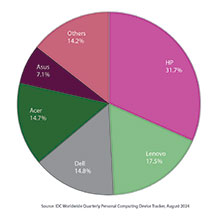India remains target of tech support scam, over 2,00,000 attacks identified: Avast
Digital Edge Bureau 05 Jul, 2021 0 comment(s)
Avast has come out with a report saying that tech support fraud remains a massive issue in India with 2,03,295 attacks identified from January through March 2021
Avast, the leading cyber security products & solution provider, has revealed that tech support fraud remains a massive issue in India with 2,03,295 attacks identified from January through March 2021. According to Avast Threat Labs, users in India are frequently attacked by technical support fraud.
Tech support scams happen when fraudsters use scare tactics to trick innocent individuals into purchasing overpriced and unnecessary ‘support services’ to fix an alleged computer, device, or software problem. They convince victims that their computer has been infected by malware; a window will pop up, alerting the user of a malware or spyware infection on their computer, and that their only recourse is to call a phone hotline for technical support. Once on the phone, scammers try to convince the callers to establish a remote connection to their computer and sometimes download a second remote management software without the user knowing to keep up a constant connection to the user’s PC.
Once granted access, bad actors can also install malware, or other malicious programs that damage the data housed on devices, or even worse, harvest personal information. Criminals with access to this type of sensitive data can leverage it to gain entry into financial accounts, health records, or other essential services. In addition, fraudsters go to great lengths to convince victims of their legitimacy, including creating web pages that imitate antivirus or firewall software warnings or even setting up fake companies to validate their con.
Alexej Savcin, Senior Malware Analyst, Avast, says, “Tech support fraud is increasingly common and targets some of the most vulnerable individuals. Criminals exploit victims through money or personal information”. “Above all, remember that whether it’s a phone call or a website, legitimate tech support won’t ever proactively seek you out to fix an issue. If in doubt, don’t engage, give access to your devices, or share any personal information. At Avast, we are passionate about supporting vulnerable populations online, like the elderly, and are available to troubleshoot any issues”.
“We urgently need to bring tech support fraud into the public awareness; they should be part of educational conversations about the internet in families and among friends. People need to talk about tech support fraud to their grandparents, parents, friends and children. Users, if in doubt of whether they are being scammed, should always talk to family members and friends about the situation they are in, as an external person may realize a scam more easily than the affected person in the heat of the moment,” elaborates Savcin.
Protecting against tech support scams
- Question what led you to the support page: if it popped up on its own, that is one major indication that the website is fraudulent.
- Check the webpage: compare the domain URL to known sites; if it is not intuitive or easy to read, the website may be a scam. Further, if the browser freezes on a tech support page, it’s an indication that something is wrong; if a tool actually detected malicious activity, the site would get blocked.
- Remember, there is no real threat until a bad actor gains access to your information or devices: although criminals may try to pressure you, stay vigilant and skeptical when online, if unsure disengage and verify credentials on your own.
- Call someone you can trust – when in doubt, reach out to a family member or someone you trust.





























































